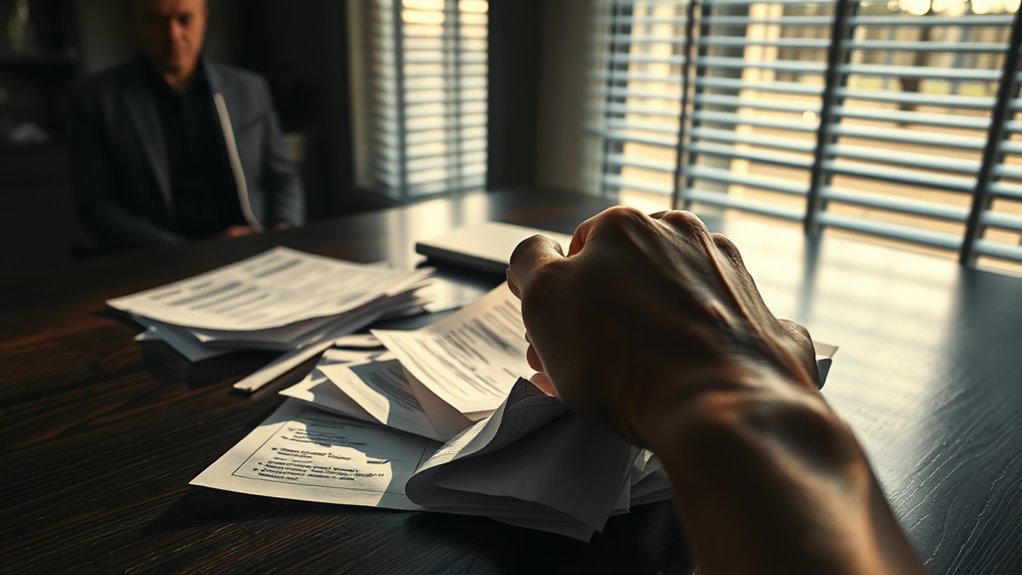Recovering from a narcissistic business partner requires spotting red flags early, securing your financial records, and establishing separate accounts to protect assets. Take immediate legal steps like freezing joint accounts and documenting all transactions. Rebuild your financial independence by improving your skills and creating emergency funds. Stay vigilant with ongoing account reviews and legal protections. Managing your emotional well-being and setting boundaries are vital, and exploring effective strategies can help you regain control and future stability—your next steps start here.
Key Takeaways
- Document all financial transactions, agreements, and communications to establish a clear record of the partnership’s misconduct.
- Secure and review financial accounts, credit reports, and legal documents to identify and freeze unauthorized activities.
- Consult with legal and financial professionals to develop long-term safeguards, including trusts or LLCs, to protect assets.
- Reassess and realign personal budgets, develop financial skills, and establish separate accounts to regain financial independence.
- Manage reputation damage by gathering evidence, working with attorneys, and maintaining transparency with clients and stakeholders.
Recognizing Signs of Financial Manipulation and Abuse

Recognizing signs of financial manipulation and abuse begins with paying close attention to how your partner controls money. If they restrict access to shared accounts or hide passwords, it’s a warning sign. Watch for them requiring approval before spending or monopolizing discretionary funds, framing this as “help,” but masking control. Notice if they keep sole authority over investments or major financial decisions. Emotional manipulation may show through guilt-tripping or undermining your judgment, accusing you of greed or recklessness. Covert tactics include hiding spending, using secondary accounts, or withdrawing funds without consent. They might create fake emergencies to access shared resources or drain funds for personal hobbies. Recognizing these signs helps you understand when your financial independence is under attack, an essential step towards recovery. Additionally, understanding the importance of financial literacy can empower you to better navigate and reclaim your financial autonomy. Developing financial awareness can further aid in detecting subtle manipulative behaviors that threaten your economic well-being. Being aware of financial control tactics can help you identify and counteract covert methods used to undermine your financial stability, such as secret accounts or undisclosed debts.
Immediate Actions to Protect Your Assets

To safeguard your assets quickly, start by securing your financial accounts—open separate ones and freeze joint accounts to prevent further access. Make sure to document every transaction meticulously, creating a clear record of all financial activity. Additionally, establish emergency funds to guarantee you have resources available if the situation worsens. Understanding the importance of legal protections, consulting with a lawyer to review contracts and rights can further strengthen your position during this critical time. Considering the diverse designs available in various financial tools can also help you make informed decisions to protect your assets effectively. Moreover, seeking guidance from a qualified attorney familiar with regional legal resources can ensure you are aware of local laws that may impact your case. Exploring electric bike options and their features can also provide insight into alternative transportation or energy solutions if needed. Being aware of dream recall techniques can also be beneficial if you need to document or analyze any related financial stress or subconscious concerns.
Secure Financial Accounts
Securing financial accounts is a critical step in protecting assets from a narcissistic business partner. Start by opening individual bank accounts at institutions inaccessible to the former partner, and freeze joint accounts to prevent withdrawals. Redirect essential payments, like rent and utilities, to these new accounts, and inform service providers about the account separation. To further safeguard, monitor credit reports regularly for suspicious activity and initiate credit freezes or blocks to limit unauthorized inquiries. Avoid co-signing any new agreements involving the former partner, and keep detailed records of all transactions. Additionally, enable real-time alerts for account activity, store sensitive documents securely—preferably encrypted—and notify financial institutions immediately if any unauthorized access is suspected. Regularly reviewing credit reports can help detect early signs of financial manipulation or fraud. Implementing security measures such as two-factor authentication enhances account protection. Developing a comprehensive financial security plan is essential to safeguarding your assets during this process.
Document All Transactions
Keeping detailed records of all transactions is essential to safeguarding your assets after a dispute with a narcissistic business partner. Accurate documentation protects your legal and financial interests and helps you identify potential issues early. Be sure to:
- Track purchase orders, invoices, and shipping documents to verify product and service transactions.
- Save bills of lading and warehouse receipts to confirm ownership and shipping compliance.
- Preserve signed credit agreements and payment schedules to enforce debts.
- Maintain records of large sales, such as auction catalogs and liquidation invoices, to document major transactions.
- Proper documentation helps ensure compliance with applicable laws and contractual obligations, reducing the risk of legal challenges.
- Incorporating organized record-keeping practices can streamline your recovery process and provide clarity during legal proceedings.
- Implementing record management systems can further enhance the accuracy and accessibility of your documentation, facilitating faster recovery efforts.
- Additionally, maintaining financial records can assist in demonstrating the true scope of your assets and liabilities during disputes or audits.
These records create a clear paper trail, reducing disputes and strengthening your position in any legal or financial review. Acting now to organize and secure these documents is critical to your recovery.
Establish Emergency Funds
Establishing an emergency fund is a critical step in protecting your business assets during uncertain times. Start by calculating your essential expenses, aiming for 3–6 months’ worth, depending on your industry and revenue patterns. Increase this amount if your business faces seasonal fluctuations or high operational risks. Allocate a portion of your revenue—around 10% of annual income or 10-25% of monthly earnings—toward this fund. Keep the money in a separate high-yield account to prevent temptation or accidental use. Automate regular transfers and restrict access to emergency-only situations. Replenish the fund quickly after use, ideally within 30–60 days. Prioritizing liquidity and ongoing review guarantees your reserves stay sufficient to cover critical costs, providing stability during turbulent times. Additionally, regular check-ins can help you establish healthy boundaries to prevent future financial stress. Incorporating proper financial management practices ensures your emergency fund remains effective and responsive to your evolving needs. For example, choosing the right home security system with the appropriate features and costs can help prevent unexpected expenses and protect your assets during challenging times. Remember, visionary quotes from experienced entrepreneurs and leaders can offer valuable insights and motivation as you navigate financial recovery.
Securing Critical Financial Documents and Records

To protect your partnership’s financial stability, you must gather and safeguard all critical documents and records. Imagine having the key papers that prove your legitimacy and clarify your financial standing. Focus on securing:
- Partnership agreement, detailing roles, profit sharing, and management.
- Financial agreement outlining contributions, accounting procedures, and budgets.
- Tax documents with company info like name, location, and partner details.
- Capital contribution records tracking loans, property, or donations.
Visualize these items stored securely, accessible only to trusted individuals, preventing tampering or loss. Ensuring you have these documents helps prevent disputes, confirms ownership, and provides a clear financial picture. Protecting these records is essential for legal compliance, future audits, and rebuilding your business’s credibility. Additionally, understanding the history of pinball machines can offer insight into how entertainment industries evolve during challenging times, providing inspiration for rebuilding trust and reputation. Being aware of financial recordkeeping practices can further help you maintain accurate documentation and support your recovery efforts. Proper documentation also ensures transparency and accountability in your recovery process, making it easier to demonstrate your financial integrity to stakeholders.
Strategies to Rebuild Financial Independence

To rebuild your financial independence, you need to reassess your budget priorities and focus on essential expenses. Strengthening your financial skills will help you make smarter decisions and regain control. By taking these steps, you’ll lay a solid foundation for future stability and growth. Understanding basic financial concepts is crucial, especially in managing your spending and investments effectively. Developing a clear credit score can also guide you in managing your financial reputation effectively. Additionally, researching city dynamics and local economic opportunities can provide insights into potential new income sources and financial growth. Leveraging AI-powered data analytics can further enhance your ability to make informed financial decisions and identify emerging opportunities.
Reassess Budget Priorities
Reassessing your budget priorities is essential after a partnership dissolves, as it helps realign financial resources with your new strategic goals. You need to focus on core objectives that reinforce your financial independence. Review past spending to identify inefficiencies and cut wasteful expenses, ensuring every dollar serves your recovery. Set clear targets like increasing cash reserves or reducing debt to measure progress. Understanding Budget Prioritization can guide you in making informed decisions that support your long-term stability. To better visualize your new priorities:
- Prioritize high-ROI projects that boost revenue
- Allocate more funds to operational stability
- Reserve 5–10% of your budget for unexpected crises
- Implement consistent budgeting processes across teams
This approach sharpens your focus, maximizes resource efficiency, and strengthens your financial foundation after the partnership ends.
Strengthen Financial Skills
Building strong financial skills is essential for regaining independence after a partnership with a narcissistic business partner ends. Start by opening separate bank accounts and credit cards to control your finances and safeguard critical documents like IDs and financial records. Monitor shared accounts for unauthorized transactions and consider freezing joint accounts to prevent further manipulation. Educate yourself on financial management by seeking advice from financial counselors and regularly reviewing your credit reports for inaccuracies. Develop a clear plan for debt repayment and prioritize eliminating high-interest debts. Keeping detailed records of all financial agreements, receipts, and legal notices is crucial for future legal actions. Understanding financial exploitation and recognizing signs of manipulation by strengthening your financial literacy and control, you lay the foundation for lasting independence and resilience.
Navigating Legal Challenges and Protecting Your Rights

Managing legal challenges after a narcissistic business partnership requires a strategic and disciplined approach. Your first step is to meticulously document every contractual breach and communication, preventing narrative manipulation. Work with an attorney who can filter your interactions, keeping conversations professional and emotionally detached. Secure critical evidence—contracts, emails, and timelines—to counter false claims. Prepare for potential escalation tactics like delays or threats by planning responses in advance. Focus on legal compliance, steering negotiations away from emotional disputes and toward contractual rights. Visualize this process with:
Document breaches, keep interactions professional, gather evidence, and plan responses to protect your legal rights effectively.
- Detailed breach records
- Controlled, lawyer-mediated communication
- Secure digital and paper evidence
- Pre-planned responses to escalation tactics
Implementing a systematic legal strategy is essential to prevent manipulation and ensure your rights are protected. Staying disciplined ensures you protect your rights and set a strong foundation for resolution.
Restoring Your Professional Reputation and Network

To restore your professional reputation and rebuild your network, you need to communicate openly and provide clear, evidence-based information about your achievements. Focus on strengthening industry relationships through strategic collaborations and sharing your expertise publicly. Consistent messaging and transparency will help you regain trust and establish your credibility once again. Additionally, implementing a comprehensive partnership agreement can serve as a legal framework to guide your future collaborations and prevent similar issues.
Rebuilding Industry Relationships
Rebuilding your industry relationships after working with a narcissistic business partner requires deliberate effort and strategic communication. You need to restore trust, demonstrate professionalism, and re-establish credibility. Start by documenting interactions and outcomes—maintain detailed records, update legal and financial documents, and track decisions to create a solid paper trail. Focus on transparent messaging to clarify roles and responsibilities, openly address past issues, and engage trusted stakeholders for endorsements. Collaborate with respected industry professionals through joint projects or mentorship to rebuild visibility. Participate in industry events, share your expertise via articles or podcasts, and showcase resilience. Finally, set clear boundaries with future partners by defining contract terms, communication protocols, and responsibilities, protecting your reputation and ensuring healthier collaborations moving forward.
Clarifying Professional Narrative
Clarifying your professional narrative is essential to restoring your reputation and rebuilding trust within your network. Focus on facts like your achievements—revenue growth, client retention, and successful projects—to counter misinformation. Maintain consistent messaging about your business values and future goals, emphasizing resilience and lessons learned. Avoid emotional responses to provocative comments; instead, stick to objective, transparent communication. Use documented processes—such as clear contracts, communication logs, and performance metrics—to demonstrate accountability and integrity. Establish boundaries by relying on written interactions and neutral feedback channels, reducing opportunities for manipulation. Rebuilding shared understanding involves regular updates to stakeholders and collaborative initiatives that reaffirm your reliability. Incorporating conflict resolution frameworks into future agreements will help prevent recurring issues and strengthen your professional reputation long-term. Additionally, documenting all interactions and decisions provides tangible evidence that can defend your credibility if disputes arise, reinforcing your professionalism and safeguarding your reputation.
Engaging Transparent Communication
How can transparent communication effectively restore your professional reputation and strengthen your network? By openly sharing information, you build trust and demonstrate accountability. Clear communication reduces uncertainty and signals honesty, encouraging others to engage confidently.
- *Accountability:* Publicly admitting mistakes and sharing audit results can reduce turnover by 40%, showing your commitment to integrity. Transparency enhances trust and reassures stakeholders of your dedication to ethical practices.
- *Social Media:* Engaging in two-way dialogue and sharing milestones fosters community and trust.
- *Consistent Information:* Regular updates and clarity in goals align internal and external messages, reinforcing reliability.
- *Stakeholders:* Addressing concerns openly and sharing successes builds trust with 86% of consumers, strengthening relationships.
Transparent communication restores credibility, rebuilds confidence, and ensures your network remains resilient during recovery.
Psychological Healing and Emotional Resilience

Recovering from a narcissistic business partnership requires intentional effort to restore your psychological well-being and build emotional resilience. The experience often leaves you dealing with emotional trauma, burnout, and health issues caused by prolonged manipulation. You may feel isolated, distrustful, or caught in cycles of hope and despair. PTSD symptoms like hypervigilance and attachment injuries can persist. To heal, focus on reclaiming your self-worth by setting boundaries, challenging internal criticism, and rediscovering your core values. Engaging trauma-informed therapy and building peer support networks are essential steps. Incorporate stress management techniques such as mindfulness or yoga, and develop routines that promote emotional stability. Prioritize self-compassion and patience, recognizing that healing is a gradual process that strengthens your resilience over time. Emotional trauma and mental health risks associated with narcissistic abuse can lead to ongoing feelings of anxiety and depression, making it crucial to address these issues proactively.
Developing Long-Term Financial Safeguards

Have you taken steps to develop long-term financial safeguards after a toxic business partnership? It’s vital to protect your assets and prevent future exploitation. Start by implementing forensic accounting to uncover hidden funds or diverted assets. Establish irrevocable trusts or LLCs to keep personal assets separate from business liabilities. Freeze shared accounts with court orders to stop malicious transactions. Use escrow services for future deals to hold funds until contractual terms are met. Consider translating legal documents into multiple languages if you deal internationally, avoiding translation errors that can be exploited. Regularly reviewing your financial statements and account activity can help detect early signs of manipulation or unauthorized transactions. By taking these measures, you create a resilient financial foundation, reducing risk and ensuring your assets are shielded from future threats. Safeguards today secure your financial future tomorrow.
Establishing Healthy Boundaries and Legal Protections

Establishing healthy boundaries and robust legal protections is essential to safeguarding yourself from continued manipulation and exploitation in a toxic business relationship. Start by securing thorough partnership agreements that clearly define roles, responsibilities, and exit clauses to prevent ambiguity. Register trademarks and intellectual property early to protect your innovations and deter misuse. Include mediation or arbitration clauses in contracts to resolve disputes efficiently and avoid drawn-out litigation. Define financial responsibilities and liability limits to shield your personal assets from potential losses. Always consult legal counsel when drafting contracts to ensure clarity and prevent ambiguous terms that could be exploited. Additionally, establish communication protocols that route all interactions through legal channels, keep detailed records, and document verbal agreements to create an evidence-based system that supports your position and reinforces your boundaries. Monitoring your intellectual property rights regularly can help detect unauthorized use early and prevent further exploitation.
Continuing Vigilance and Future Financial Planning

After setting firm boundaries and securing legal protections, maintaining vigilance over your financial landscape becomes essential to prevent future manipulation. You need to stay alert to lingering entanglements and control tactics. Regularly audit your joint accounts and property titles to spot hidden ties, like covertly listed names or unresolved debts. Avoid new ventures without legal review, and document all transactions meticulously—consider using blockchain tools for transparency. Watch for emotional manipulation, such as guilt-tripping or withholding funds as punishment, and recognize “generosity” that comes with strings attached. Educate yourself on narcissistic financial behaviors to spot red flags early. To stay protected, establish strict approval protocols, update estate plans, diversify investments, and schedule regular reviews with financial and legal advisors. Vigilance ensures your financial independence remains intact. Additionally, being aware of their tendency to conceal or manipulate financial details can help you identify potential risks before they escalate.
Frequently Asked Questions
How Can I Detect Hidden Financial Abuse Early?
To detect hidden financial abuse early, stay alert for unusual account activities like sudden withdrawals or transfers to unknown entities. Watch for sudden leadership changes or restricted access to financial records. Notice if assets are hidden, personal and business finances are blurred, or if expenses seem excessive or unaccounted for. Be cautious of altered documents or unusual debt accumulation. Regular audits and transparency can help uncover these red flags before they worsen.
What Are the Best Legal Strategies for Asset Recovery?
Did you know 70% of asset misappropriation cases involve fraud or breach of fiduciary duty? To recover assets, you should file lawsuits for fraud, conversion, breach of fiduciary duty, and undue influence. Seek restitution and damages, including punitive damages for egregious misconduct. Protect your assets by filing caveats, obtaining court injunctions, and working with experienced attorneys. Document everything thoroughly and consider negotiation or settlement to minimize costs and maximize recovery.
How Do I Rebuild Trust in My Financial Decisions?
You start rebuilding trust in your financial decisions by practicing transparency, like documenting all transactions and decisions. Set small, achievable goals to regain confidence, and celebrate each success. Seek advice from trusted financial advisors and join support networks to share progress and gain feedback. Avoid rushing into big commitments until you feel more secure. Over time, these steps help you trust your judgment and rebuild your financial independence.
What Steps Help Restore My Professional Reputation Quickly?
Your reputation is a fragile garden needing tender care. To restore it quickly, start by transparent communication—share honest updates and issues you’ve faced, showing accountability. Reinforce your credibility through consistent messaging aligned with your core values. Engage your community with proactive outreach, positive testimonials, and industry thought leadership. By demonstrating genuine change and dedication, you’ll gradually rebuild trust, turning a once-damaged landscape into a flourishing demonstration of resilience.
How Can I Prevent Similar Abuse in Future Partnerships?
To prevent similar abuse in future partnerships, you should set clear legal safeguards like detailed agreements and dispute resolution methods. Be vigilant for red flags such as inconsistent work ethic or unethical behavior. Conduct thorough vetting by checking references, asking tough questions, and running trial periods. Establish operational controls like role-specific accountability, regular audits, and decision-making thresholds. These steps help you build healthier, more transparent partnerships and protect your interests.
Conclusion
As you close this chapter, remember you’re steering your ship away from stormy waters into calmer seas. Trust your compass—your intuition—and steer clear of hidden reefs that threaten your course. With each step, you’re planting seeds for a resilient future, transforming past turbulence into a steady voyage. Keep your sails trimmed with knowledge and boundaries, and you’ll navigate toward brighter horizons, where your finances and reputation can flourish once more.










